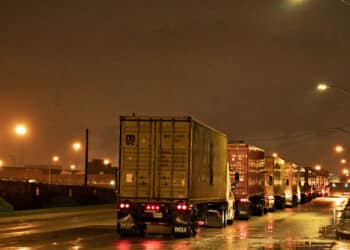IronConnect, BB Logistics launch streamlined repo service
Used medium-duty truck auction values fell 7.5% YoY in August
Equipment inventory management platform IronConnect and transportation services provider BB Logistics are working to streamline the repossession process for lenders.
The companies’ solution, launched this week, aims to simplify repossessions and also help lenders maximize returns when liquidating returned equipment, AJ Neifert, president and co-founder of Lincoln, Neb.-based IronConnect, told Equipment Finance News.
“We looked at the market and saw the processes that a lot of these lenders were going through. A unit would come back and they lacked the timing, the resources to get the most out of these units.”
— AJ Neifert, president, IronConnect
“In a lot of instances, when a unit came back on repossession, it immediately went to the auction, and with that comes lower returns,” he said. “There’s a lot of fees. There’s risk.”
With more than 700 storage yards, BB Logistics will handle the pickup, transport, storage, inspection and refurbishing of equipment. IronConnect will then take over, remarketing the machines through its private network of dealers and buyers.
And while equipment auction values have stabilized somewhat this year, primarily in the construction sector, there’s still volatility in the overall auction market. For example, auction values for used medium-duty trucks decreased 7.5% year over year in August, and used forklift values fell 6.1% YoY, according to Sandhills Global.
Implications huge for lenders, trucking industry
Ensuring that equipment is in the best possible condition can help lenders achieve higher returns on repossessed assets, Neifert said. Reselling equipment privately also protects retail values, benefiting the industry overall, he said.
“All of those [auction] results become very public information which, at the end of the day, drags down retail values,” he said. “If we can move some of these units privately… that should theoretically increase residual values down the road.
“We’re not saying that there’s never going to be a unit that needs to go to auction, but we’re providing a solution so that we can try to market this first and not have to go straight to that part of it.”
— AJ Neifert, president, IronConnect
In the truck finance sector, many lenders are hesitant to repossess — or are pulling back from the transportation segment — after taking huge losses through auctions in recent years, according to equipment research firm IronAdvisor Insights. These lenders are allowing poor-performing carriers to operate longer than they should be, prolonging the freight industry recession as overcapacity persists while credit standards tighten.
Thus, a more streamlined repossession process could have major implications for trucking, IronConnect’s Neifert said.
“When you talk about the truck market specifically, those guys took a beating on repos in 2023 and ‘24,” he said. “Hopefully, this gives lenders a piece of confidence to say, ‘I can go make these deals knowing that I’ve got a good way to get rid of that truck at the end of the day.’”
Simplified repossessions could immediately impact the market, as more than 30 trucking companies have filed for bankruptcy since the start of the second quarter.
Read more about bankruptcies here.
Speeding repo
Identifying the location and condition of equipment are crucial first steps in the repossession process and play a huge role during negotiations between creditors and debtors, Sara Costanzo, a shareholder and creditor rights attorney at Weltman, Weinberg & Reis, told EFN.
“If it’s any type of vehicle, to make sure that it’s not at risk of damage, or if we need to get relief from stay to repossess any collateral, we need to know where it is located so we can proceed in the proper venue,” she said.
By assisting with the pickup and inspection of equipment, lenders should see improved timelines when repossessing and liquidating, Neifert said.
“We now have a place to safely secure it, store it,” he said. “We can have an inspection right away. We can make keys if we need to. We can clean the machine up to where they can actually market it. That was a big hole in the actual process that these lenders had.”
Check out our exclusive industry data here.









